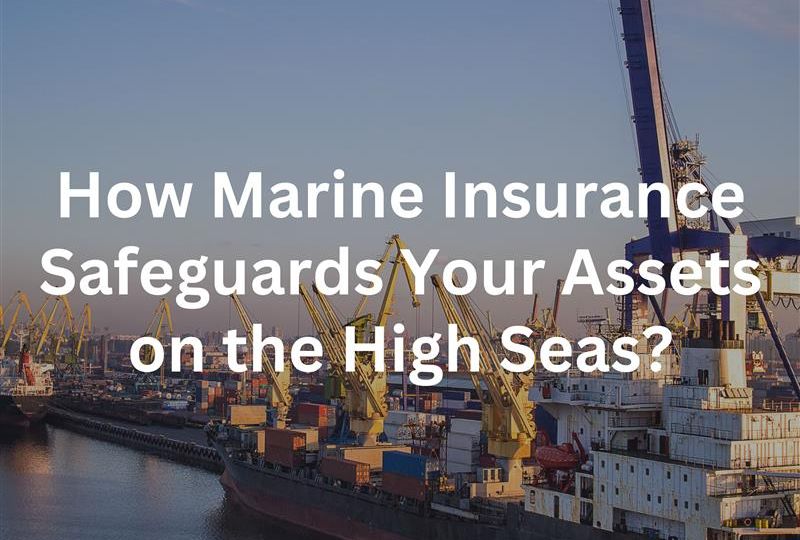
The ocean has always been a gateway for trade, adventure, and discovery. But for those who depend on the seas for transporting goods, it’s a place filled with unending risks. From sudden storms to mechanical failures, it can quickly turn into a dangerous place. One accident, theft, or bad weather can cause severe damage to ships and cargo. That’s where marine insurance comes in. It offers a safety net to protect your valuable assets from the uncertainties of the ocean.
How do businesses manage to stay afloat in the danger of ocean travel? The answer lies in marine insurance. It allows you to sail with confidence even when the seas get rough. This blog will explain how it works and why it’s vital for your safety at sea.
Why Marine Insurance is Essential in Today’s Global Trade
The oceans connect the world’s economies. Every day, millions of tons of goods are transported across vast distances, from electronics to pharmaceuticals, from raw materials to luxury items. Maritime trade is one of the most cost-effective and efficient ways to move goods. A small mistake, a sudden storm, or an unexpected mechanical issue can result in huge financial losses. For businesses depending on it, these risks are part of the job and can be impossible to predict.
Marine insurance acts as a critical safeguard, offering protection against a wide range of potential threats. In essence, it provides a financial safety cushion, ensuring that if disaster strikes, the people involved don’t have to panic trying to pay for the damages. This sense of security makes it an indispensable part of the maritime industry. It gives businesses the confidence to take on new trade routes and ship higher-value goods.
The Role of Marine Insurance in Risk Management
The risks associated with ocean travel are numerous and varied. A ship could encounter a storm, a rogue wave, or a collision at sea. During transit, cargo may sustain damage or theft. Piracy remains a threat in certain regions, while other hazards, such as fire or mechanical failure, can arise without warning.
For businesses, these risks represent far more than a nuisance. They have the potential to cause significant loss. The cost of repairing a damaged ship or replacing lost cargo can run into the millions of dollars. Without insurance, such losses could force companies into bankruptcy or leave individuals exposed to financial ruin. It offers a crucial solution by spreading the financial burden across multiple parties. It ensures that the insured can recover their losses swiftly and efficiently.
Insurance providers work with shipowners, cargo companies, and logistics professionals to assess the level of risk involved in each voyage. The route, cargo type, and vessel or carrier history are all considered. Based on this assessment, insurers determine the premiums, coverage limits, and terms of the policy. The goal of each policy is to assure ship owners that their goods are safe from the sea’s uncertainties.
How Does It Provide Financial Protection?
If an incident occurs during transit, the owner of the cargo or vessel can file a claim to recover the costs incurred. This is what distinguishes a company going bankrupt after a disaster from one that manages to continue operations with only minor setbacks.
For example, consider a shipping company transporting goods through a region known for frequent storms. Without insurance, the company would bear the full cost of any damage caused by a storm. However, with the right insurance policy in place, it can recover a significant portion of the damage. It will help them stay afloat financially.
Marine insurance helps companies stay ahead of potential risks. By partnering with experienced insurers, businesses can figure out the biggest threats to their operations. They can also take steps to avoid them. Such steps could mean changing shipping routes, improving safety measures, or getting extra coverage for valuable goods. These smart strategies help keep costs in check and reduce the chances of significant losses.
Legal and Regulatory Requirements
In addition to the financial and operational benefits, it is also a legal necessity. A range of laws and conventions govern international shipping. It requires specific types of insurance to be in place before vessels can operate. For instance, the International Maritime Organization (IMO) mandates that ships must have appropriate liability coverage to protect against environmental damage. Similarly, various countries have regulations regarding cargo insurance, especially for high-value or hazardous goods.
Complying with these regulations is essential not only to avoid fines and penalties but also to ensure that the ship, cargo, and crew are covered in the event of an accident. Apart from a legal requirement, marine insurance also serves as a way to ensure the safety and well-being of individuals working on the high seas, protecting them from liabilities and injuries.
The Lifeline of Global Trade for Every Shipowner!
As the backbone of global trade, the maritime industry plays a crucial role in the movement of goods across continents. By offering financial protection against a wide range of risks, marine insurance ensures that ships, cargo, and crew are safeguarded in the face of adversity.
If you are a business owner and looking to get your goods insured, Faith Logistics is the best marine insurance company in Singapore. We offer unmatched personalized services to safeguard your operations. We make sure that your ventures on the high seas remain profitable and secure.
Contact Faith Logistics to navigate your insurance needs!

